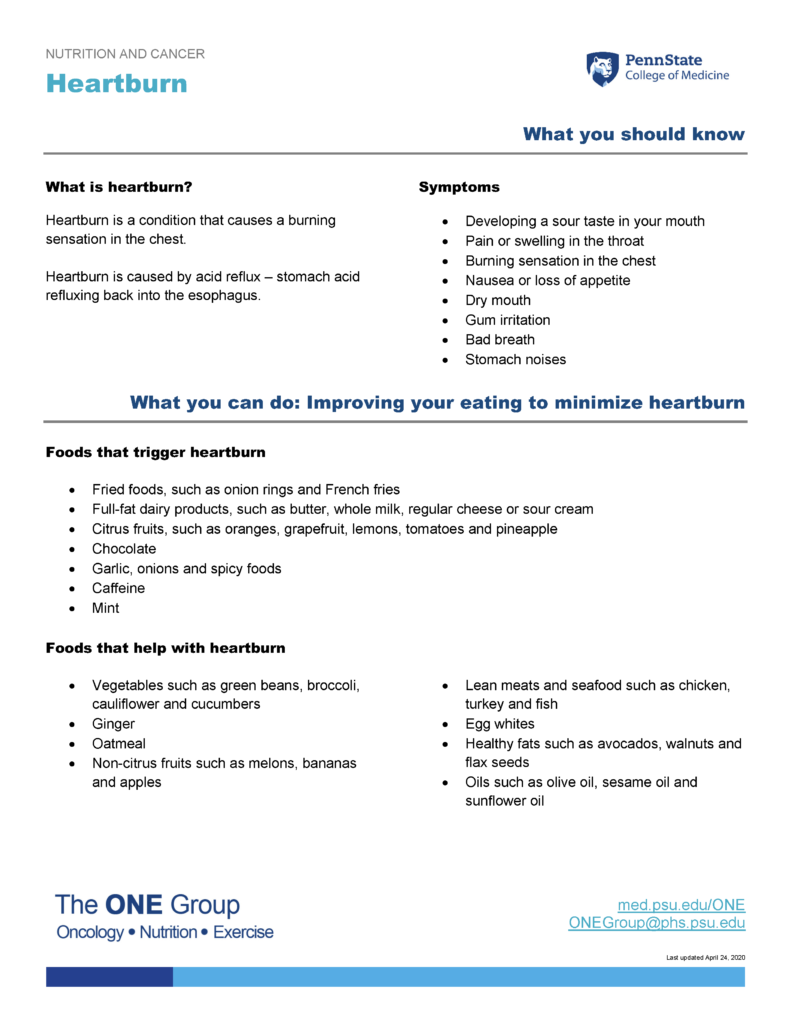Learn about heartburn in people with cancer in this guide from The ONE Group (Oncology – Nutrition – Exercise) at Penn State College of Medicine.
Jump to topic
Search
What you should know
What is heartburn?
Heartburn is a condition that causes a burning sensation in the chest.
Heartburn is caused by acid reflux – stomach acid refluxing back into the esophagus.
Symptoms
- Developing a sour taste in your mouth
- Pain or swelling in the throat
- Burning sensation in the chest
- Nausea or loss of appetite
- Dry mouth
- Gum irritation
- Bad breath
- Stomach noises
What you can do: Improving your eating to minimize heartburn
Foods that trigger heartburn
- Fried foods, such as onion rings and French fries
- Full-fat dairy products, such as butter, whole milk, regular cheese or sour cream
- Citrus fruits, such as oranges, grapefruit, lemons, tomatoes and pineapple
- Chocolate
- Garlic, onions and spicy foods
- Caffeine
- Mint
Foods that help with heartburn
- Vegetables such as green beans, broccoli, cauliflower and cucumbers
- Ginger
- Oatmeal
- Non-citrus fruits such as melons, bananas and apples
- Lean meats and seafood such as chicken, turkey and fish
- Egg whites
- Healthy fats such as avocados, walnuts and flax seeds
- Oils such as olive oil, sesame oil and sunflower oil
Lifestyle changes that can help to minimize heartburn
- Try to avoid stress. Stress can cause heartburn or make the heartburn worse. Try meditating in the mornings to relieve stress.
- Sometimes it helps to lose weight. Ask for a referral to a dietitian. They can help with a more personalized diet.
- Exercise moderately for 15 to 30 minutes every day.
- Wait an hour after eating to exercise.
- Avoid laying down after eating a meal.
- Try not to eat within two to three hours before you go to bed. This can help prevent the secretion of extra acids. Laying down can make the pain worse.
- Sleep with your head and shoulders elevated.
- Enjoy smaller, more frequent meals throughout the day. Eat each meal slowly.
- Wear loose clothing.
- Keep a food diary to note which foods cause heartburn.
- Avoid tobacco.
- Limit caffeine and alcohol.
Where can I find more information about aerobic and strength-training exercises?
If you are interested in starting aerobic and/or strength-training exercises, The ONE Group (Oncology – Nutrition – Exercise) provides videos demonstrating proper form for more than 50 exercises.
Notes
Contact your physician if:
- You are having symptoms of heartburn. Your physician may prescribe medication to help relieve the heartburn.
- You notice blood in your bowel movements.
- You have difficulty breathing, eating or swallowing.
References
- American Cancer Society

